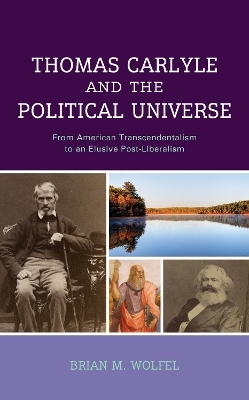
Thomas Carlyle and the Political Universe
Lexington Books/Fortress Academic (Verlag)
978-1-6669-5423-4 (ISBN)
Thomas Carlyle and the Political Universe: From American Transcendentalism to an Elusive Post-Liberalism recognizes and reckons with Thomas Carlyle’s broad and deep influence on politics, on a global scale. Having influenced and inspired iconic and impactful political thinkers and actors such as Ralph Waldo Emerson, Henry David Thoreau, John Stuart Mill, Charles Dickens, Karl Marx, and Martin Luther King Jr., among so many others, Carlyle is a captivating persona in modern political history. In this way, if there is one person who could be said to be the central figure of what may be called the “political universe,” all that the term politics comprises, Brian Wolfel argues that it is Thomas Carlyle. As the point of nexus of so many political figures embodying such a diversity of political persuasions, Carlyle is also a significant philosopher in Plato’s lineage whose ideas can be further constructed and developed in the context of the work of prominent 20th-century political thinkers such as John Rawls, Alasdair MacIntyre, Jacques Ellul, and Sayyid Qutb. Carlyle’s conceptualization of transcendentalism in Sartor Resartus was a foundation for Emerson, Thoreau, and American Transcendentalism. In the midst of ideological battle in the 20th and 21st centuries, among such ideologies as liberalism, communism, fascism, and Islamism, Carlyle’s transcendentalism largely went unnoticed as a potential ideological competitor. Carlyle’s transcendentalism can be developed and constructed in the contexts of modern political theory and religion, and can be defended and promoted as a potential post-liberalism, a refinement of and evolution from liberal democracy and capitalism.
Brian M. Wolfel is postdoctoral fellow in the Department of Political Science at Purdue University Fort Wayne, and he has previously taught at Hamilton College and SUNY Oswego.
Introduction
Chapter 1: The Scope of Thomas Carlyle in the History of Political Thought
Chapter 2: Carlyle’s Latter-Day Pamphlets and the Limits of Political Theory
Chapter 3: Carlyle’s Transcendentalism as a Platonic Political Philosophico-Religion: A Comparison of Transcendentalism with Islam and Islamism
Chapter 4: The Antagonism of Thomas Carlyle and John Rawls
Chapter 5: Carlyle’s Construction of Justice and Contemporary Political Philosophy
Chapter 6: Carlyle, Ellul, and Their Critiques of Modernity
Chapter 7: Carlyle’s Theory of the Phoenix and the Dissolution of Liberalism?
Conclusion: Carlyle’s Transcendentalism and a New Stage of Political Development?
| Erscheinungsdatum | 25.04.2024 |
|---|---|
| Sprache | englisch |
| Maße | 161 x 238 mm |
| Gewicht | 562 g |
| Themenwelt | Sozialwissenschaften ► Politik / Verwaltung ► Politische Systeme |
| Sozialwissenschaften ► Politik / Verwaltung ► Politische Theorie | |
| Sozialwissenschaften ► Politik / Verwaltung ► Staat / Verwaltung | |
| ISBN-10 | 1-6669-5423-3 / 1666954233 |
| ISBN-13 | 978-1-6669-5423-4 / 9781666954234 |
| Zustand | Neuware |
| Haben Sie eine Frage zum Produkt? |
aus dem Bereich


